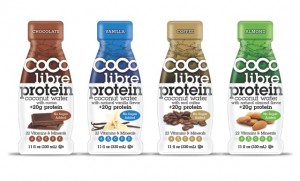To meet evolving consumer demands, brands are reinventing themselves, becoming more difficult to classify, yet also increasing their ability to provide multifaceted functionality and flavor in a basic, convenient manner. These hybrid products, which formed a significant base of the conference, are signaling the trends of tomorrow’s SKUs.

“We don’t believe in a monochromatic world,” said Sambazon CMO Greg Fleishman.
Instead, Fleishman said, consumers want to achieve as much as they can within a single bottle. They want their greens and fruit, along with satiety and energy. Sambazon’s two newest products — Energy Mocha Java and Blended Breakfast — were made with this growing trend in mind, aiming to service customer needs and always considering convenience.
Sambazon’s Mocha Java, an extension of its Energy line of drinks, is made with Fair Trade acai, coffee, yerba maté, guarana and Peruvian cocoa. Blended Breakfast, flavored with strawberry and banana, is made with fiber, gluten-free amaranth and quinoa, acai and chia.
And while these products are loaded with health benefits and a hybridization of ingredients, Sambazon also markets their identities. The packaging avoids over-the-top cluttering of information, leading to greater clarity.
This push for comprehensible branding, some argue, is essential to selling hybrid products.
“I think you can’t be too many things to the consumer,” said Mark F. Shaw, president, founder and CEO of Maverick Brands, marketer of Coco Libre products. “If you try to be five different things, it’ll fail.”
To respond to the need for multifaceted functionality and simplicity, Shaw outfitted Coco Libre Protein, a four-SKU line that debuted at Expo West, with a label featuring the brand name in large letters along with the word “protein.” The line, which blends coconut water and 20 grams of whey and milk protein isolate, features four flavors — Chocolate, Vanilla, Coffee and Almond.
Shaw said that the new, gluten-free line, which packs the protein of three eggs, the calcium of two cups of milk, the magnesium of a cup of broccoli and 22 vitamins and minerals, will target consumers who don’t want to bring eggs to the gym but still need a high source of protein, among other benefits.
“We’re sort of putting it as the über beverage,” Shaw said.
With the rise of brands like Vita Coco, ZICO and O.N.E., coconut water was one of the most commonly found beverage styles at Expo West. Startups from diverse backgrounds presented their takes on coconut water, and many brands showcased variations of the original.
For one, Steaz, which is known for its assortment of iced green teas and energy products, debuted a green tea made with coconut water. The beverage contains certified organic and Fair Trade green tea blended with organic coconut water and organic cane sugar.
AMAzon Waters, launched at Expo West in 2011, produces flavored functional waters with 10 percent coconut water and extracts. The brand also makes coconut teas, which are made with 80 percent tea (rooibos, green, white or black) and 20 percent coconut water.
Ed Newman, VP of Sales for AMAzon Waters, said that he never intended on making the coconut teas. He originally intended to produce the functional waters and watch them drive his business. When he saw how strongly coconut water was performing, however, he felt that he had to join the party. Thus coconut water, previously far from the plans, became a core part of AMAzon Waters.
Newman said that with help from investors who were connected to coconut plantations in Brazil, the coconut tea came to life. And while the drink is somewhat esoteric compared to other beverages in the natural channel, the brand as a whole recognizes the need for a consistently appealing taste and an easily recognizable product.
“You can’t let it get too complicated,” he said. “Is still has to taste good and be priced right.”
B.J. McCaslin, co-founder of Coco Cafe, believes that by blending coconut water with coffee, his company has meshed desirable functionality with great taste. And to expand upon the success of its original latte flavor, McCaslin, along with co-founder Elan Eifer, spent much of the show sampling Coco Cafe’s newest varieties, mocha and vanilla. McCaslin noted that consumers are increasingly seeking out products that meld popular (and on-trend) ingredients and flavors into a single product; he believes that it’s a big part of his company’s rapid growth.
And he’s not alone. This trend, fully displayed at Expo West from industry veterans like Sambazon to younger brands like AMAzon Waters, could continue fueling America’s growing interest in good health and having everything at once.
“I think you’re going to see, generally across the board, hybridization of every single category,” Shaw said. “Whether it’s juice, protein, chia, I think you’re going to see a blending, because consumers want general health benefits.”





